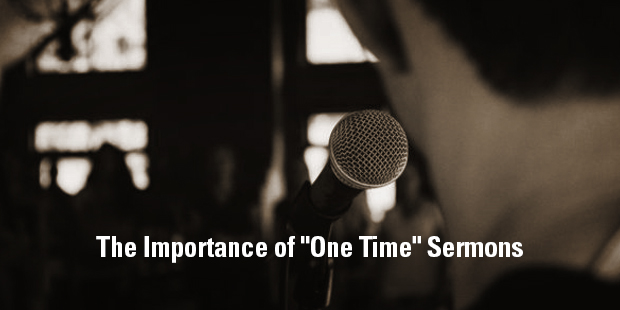
The Importance of “One Time” Sermons
I remember the first time I preached a sermon, though it’s unlikely anyone else does. In fact, I’m actually relieved that no record remains of its existence. I was asked to preach one time and, like many other first-time preachers, I brought everything I knew into that message. It was long, painful, and scattered–but a kind group of older adults not only invited me to preach, they also patiently sat through my message–though they never asked me back.
Preaching a stand-alone message can be tricky. For me, they generally fall in between sermon series (as I much prefer to preach) or when I am invited somewhere as a guest preacher.
Sometimes, as a guest preacher you are part of a series. For example, at one church, I simply continued the series (though I was a little bitter with the passage I was assigned). This isn’t too difficult– you listen to a few messages before, tie in to those, and help the pastor along the way.
However, it’s harder when you are the guest preacher with a single topic. I think you can go about it in two legitimate ways.
1. Preach a text on a topic.
2. Preach a topic with texts.
Preaching a Text on a Topic
A message is supposed to be grounded in the text, but text-based messages can still become exegetically irresponsible if we force a theme onto a text when it really does not fit. For example, if you are preaching on “motherhood” on Mother’s Day, it might be better to connect with multiple texts rather than preach a text that touches on motherhood and you make it all about motherhood.
So, when preaching a text on a topic, you need to be careful that you don’t let the topic mold the text. Rather, the text, if appropriate, will inform and mold your approach to the topic. However, approaching a message in this way means it may look somewhat different from a standard expositional treatment of the passage. If I am preaching a text on a topic, I do not tell everything I would in a verse-by-verse exposition. Instead, I talk about how this verse undergirds the topic, but also that it addresses more than this topic. I say that, but I do not explain that–there is not time. The topic will limit, to a certain degree, what I unpack from the passage.
For example, when I filled in at another church, I preached from a text on a topic. The text, 1 Peter 4:8-11, involves much more than “Engaging all God’s People in Mission,” but it does include that. When I preach a one week message, after all the study and preparation I wind up leaving a lot on my desk that I don’t take with me into the pulpit. But, I make sure that what I do take is faithful to that text.
Preaching a Topic with Texts
On the other hand, one can also responsibly preach a topic with texts.
I recently returned from a church where my job was to encourage people to “live sent.” I preached a topic with a few texts. The topic was how we might live as the sent people of Jesus. The texts (as well as the title) were the “Sendings of Jesus.” These commissions included John 20:21, Matthew 28:18-20, Luke 24:46-48, and Acts 1:8.
The principles are actually the same. I wound up leaving a lot on my desk, but I worked hard to be faithful in what I brought with me to preach.
Or, once when I preached, the theme was the “seven last words of Jesus.” My assignment was forgiveness. In this case, it was actually both: explain the context of the verse and then teach on my assigned topic– forgiveness. My assigned topic was not just what Jesus did, but how it impacts what God has called us to do. Thus, I made it clear that, “Forgiveness: It’s who God is, it’s why Jesus came, and it’s what Christians do.”
How do you avoid being irresponsible with the text? Well, I believe it is easier to be responsible with a series– which is why I think series are better! If you are preaching through a book, it is simply following the arguments, themes and stories of the author. If you are preaching doctrinally or thematically, you can bring the whole counsel of God to a topic by being faithful to what the scripture teaches in its multiple mentions of the topic.
However, you simply cannot be as thorough in a one shot message.
Here is what I try to do.
1. Never use verses in way that would result in the Apostle Paul (or Moses, Jesus, etc.) to say, “Whoa, that was not my point.”
2. Don’t share everything that you know–leave some things on your desk and tell people you are doing so.
3. Don’t preach a single message like a series– you can’t do it well. Single messages have limitations and you have to live with them.
4. Point people to Jesus. Don’t simply leave them with commands, lead them to the promises of God in Jesus.
I should end with my bias. I don’t like single messages. I prefer series because I find I can present a clearer picture of scriptural teaching on an issue. But, do not despise the single message–nobody ever preaches a series in the Bible, and we don’t see it much until John Chrysostom in the 4th/5th century.
Be faithful with the small things… even the small sermons.

Tags: Ed Stetzer, Preaching, Sermon, one time message, one time sermon












